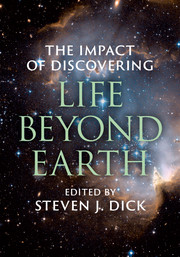Book contents
- Frontmatter
- Dedication
- Contents
- List of contributors
- Introduction: Astrobiology and society
- Part I Motivations and approaches: How do we frame the problems of discovery and impact?
- Part II Transcending anthropocentrism: How do we move beyond our own preconceptions of life, intelligence, and culture?
- Part III Philosophical, theological, and moral impact: How do we comprehend the cultural challenges raised by discovery?
- Part IV Practical considerations: how should society prepare for discovery – and non-discovery?
- Contributor biographies
- Index
- References
Part I - Motivations and approaches: How do we frame the problems of discovery and impact?
Published online by Cambridge University Press: 05 November 2015
- Frontmatter
- Dedication
- Contents
- List of contributors
- Introduction: Astrobiology and society
- Part I Motivations and approaches: How do we frame the problems of discovery and impact?
- Part II Transcending anthropocentrism: How do we move beyond our own preconceptions of life, intelligence, and culture?
- Part III Philosophical, theological, and moral impact: How do we comprehend the cultural challenges raised by discovery?
- Part IV Practical considerations: how should society prepare for discovery – and non-discovery?
- Contributor biographies
- Index
- References
Summary
Introduction
For the most part in this volume we assume that life exists beyond Earth and ask what the implications are if a discovery is made. In other words, we begin where most scientific discussions of astrobiology end. Before we head down that path, however, it is prudent to ask why we should believe such life exists. A large literature exists on this subject, ranging from the optimistic (e.g. Davies, 2010; Shklovskii and Sagan, 1966) to the skeptical (Gonzalez and Richards, 2004; Ward and Brownlee, 2000). It is not the purpose of this section to adjudicate between the optimists and pessimists, only to see why studying the societal implications of finding life beyond Earth is a valid endeavor.
The first two chapters of Part I summarize the arguments of the optimists from the point of view of both science and philosophy. Seth Shostak, a radio astronomer and Director of the Center for SETI Research at the SETI Institute, discusses the three broad empirical approaches to the search for life: direct exploration by spacecraft, biosignatures in planetary atmospheres, and the search for signals of artificial origin. Should one of these searches prove successful, he believes the societal reaction might be less dramatic than often assumed. Others in this volume beg to differ. Iris Fry, a philosopher who has written extensively on the history of the origins of life controversy (Fry, 2000), examines our deep philosophical presuppositions in the search for life – the Copernican assumption that the Earth is not special, and the Darwinian assumption that life emerged and evolved on Earth by natural processes and might do so wherever biogenic conditions prevail. While these presuppositions are not proven, she argues that astrobiologists are continually testing them, and there are grounds for being optimistic that their assumptions are valid. She contrasts this with the presuppositions of the Intelligent Design movement, some of which implicitly or explicitly drive opposition to the search for life (as in Gonzalez and Richards, 2004). Those assumptions, she argues, are not testable. In other words, some presuppositions are better than others. This does not mean we are lacking good arguments against the existence of life beyond Earth, only that valid grounds exist to proceed with the search and to study potential societal implications.
- Type
- Chapter
- Information
- The Impact of Discovering Life beyond Earth , pp. 7 - 8Publisher: Cambridge University PressPrint publication year: 2015



